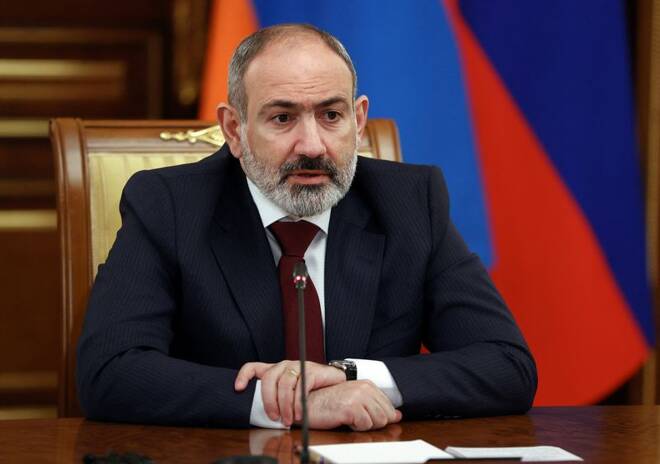Advertisement
Advertisement
Armenian protesters block government buildings in bid to force out PM
By:
TBILISI (Reuters) - Thousands of demonstrators blocked access to government buildings in the Armenian capital Yerevan on Friday in the latest of a spate of protests demanding the resignation of the prime minister.
TBILISI (Reuters) – Thousands of demonstrators blocked access to government buildings in the Armenian capital Yerevan on Friday in the latest of a spate of protests demanding the resignation of the prime minister.
Pressure against Nikol Pashinyan has increased since he moved closer to normalising relations with Azerbaijan, which defeated Armenia in a six-week war in 2020.
The unrest also coincides with Russia’s war in Ukraine, which is prompting its former Soviet neighbours to reassess their own security and their relations with Moscow.
Protests have simmered in Armenia for weeks since Pashinyan said the international community wanted Yerevan to “lower the bar” on its claims to the disputed Nagorno-Karabakh region.
Video posted on YouTube showed protesters, led by opposition figures, brandishing tricolour Armenian flags and chanting anti-government slogans as rows of police officers guarded the buildings.
“With this we are showing that Nikol (Pashinyan) has no power in the country,” TASS news agency quoted Ishkhan Saghatelyan, vice president of Armenia’s National Assembly, as saying.
Pashinyan’s comments on Nagorno-Karabakh came as Azerbaijan has said it was ready for peace talks to take place soon but that Yerevan would need to renounce any territorial claim against his country.
The Nagorno-Karabakh enclave is internationally recognised as part of Azerbaijan but was populated and fully controlled by ethnic Armenians until they lost to Azerbaijan in a six-week war in 2020.
With Russia’s invasion of Ukraine, another former Soviet country, Armenia has begun pondering its relations with its neighbours to reduce the external threats it could face.
“The war has caused all of Moscow’s partners to reconsider their relationships,” said Laurence Broers, an associate fellow of the Russia and Eurasia Programme at Chatham House in London.
“In Armenia there is concern that in a worst case scenario Armenia may be coerced into some kind of union state relationship with Russia, and consequently that Armenian statehood itself is in doubt.”
Armenia is currently a close ally of Russia, which has a military base in the northwest of the country and sent peacekeepers to Nagorno-Karabakh under the accord that ended the fighting in 2020.
Pashinyan has insisted he would not sign any peace deal with Azerbaijan without consulting the ethnic Armenians in Nagorno-Karabakh.
(Reporting by Reuters; Editing by Mark Trevelyan and Angus MacSwan)
About the Author
Reuterscontributor
Reuters, the news and media division of Thomson Reuters, is the world’s largest international multimedia news provider reaching more than one billion people every day. Reuters provides trusted business, financial, national, and international news to professionals via Thomson Reuters desktops, the world's media organizations, and directly to consumers at Reuters.com and via Reuters TV. Learn more about Thomson Reuters products:
Advertisement
